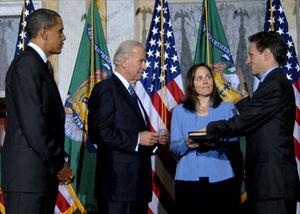Timothy Geithner facts for kids
Quick facts for kids
Timothy Geithner
|
|
|---|---|
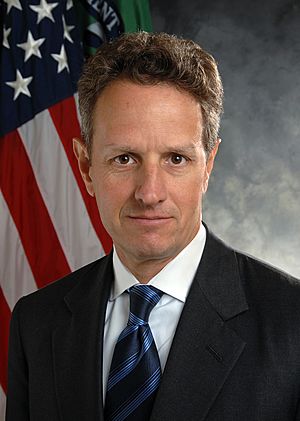
Official portrait, 2009
|
|
| 75th United States Secretary of the Treasury | |
| In office January 26, 2009 – January 25, 2013 |
|
| President | Barack Obama |
| Deputy | Neal S. Wolin |
| Preceded by | Henry Paulson |
| Succeeded by | Jack Lew |
| 9th President of the Federal Reserve Bank of New York | |
| In office November 17, 2003 – January 26, 2009 |
|
| Preceded by | William Joseph McDonough |
| Succeeded by | William C. Dudley |
| United States Under Secretary of the Treasury for International Affairs | |
| In office July 3, 1998 – January 20, 2001 |
|
| President | Bill Clinton |
| Preceded by | David A. Lipton |
| Succeeded by | John B. Taylor |
| Personal details | |
| Born |
Timothy Franz Geithner
August 18, 1961 New York City, U.S. |
| Political party | Independent |
| Spouse |
Carole Sonnenfeld
(m. 1985) |
| Children | 2 |
| Education | Dartmouth College (BA) Johns Hopkins University (MA) |
| Signature | |
Timothy Franz Geithner (born August 18, 1961) is an American expert on money and banking. He served as the 75th United States Secretary of the Treasury for President Barack Obama from 2009 to 2013. The Secretary of the Treasury is in charge of the nation's money.
Before that, he was the president of the Federal Reserve Bank of New York from 2003 to 2009. The Federal Reserve is the central bank of the United States, and it helps keep the country's economy stable.
Geithner played a very important role in the government's efforts to handle the 2008 financial crisis and the Great Recession. This was a time when many banks and businesses were in trouble. He helped make big decisions about how to help companies like Bear Stearns, Lehman Brothers, and American International Group (AIG).
Contents
Early Life and Education
Timothy Geithner was born in Manhattan, New York. His father, Peter, worked for the Ford Foundation, a charity that helps people around the world. Because of his father's job, Geithner spent most of his childhood in other countries, including Zimbabwe, Zambia, India, and Thailand.
Living abroad helped him learn about different cultures and languages. He studied Mandarin Chinese at universities in Beijing. He later went to Dartmouth College and graduated in 1983 with a degree in Government and Asian studies. He also earned a master's degree in international economics from Johns Hopkins University.
Career Before the Federal Reserve
After college, Geithner worked for Kissinger Associates, a consulting firm in Washington, D.C. In 1988, he joined the U.S. Treasury Department. This department manages the U.S. government's money.
He held several important jobs at the Treasury. He worked at the U.S. Embassy in Tokyo and later became the Under Secretary of the Treasury for International Affairs. In this role, he helped manage money problems in countries like Brazil, Mexico, and South Korea.
In 2001, he left the Treasury for a short time. He worked for the Council on Foreign Relations and then the International Monetary Fund (IMF). The IMF is an organization that works to keep the world's economy stable.
President of the New York Federal Reserve
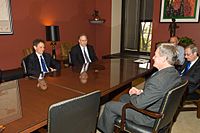
In 2003, Geithner became the president of the Federal Reserve Bank of New York. This is one of the most important banks in the Federal Reserve System. In this job, he was a key figure in the government's response to the 2008 financial crisis.
The 2008 Financial Crisis
In 2008, the U.S. economy faced a huge crisis. Many banks had made risky choices and were in danger of failing. This could have hurt the entire economy.
Bear Stearns and Lehman Brothers
In March 2008, the investment bank Bear Stearns was about to go out of business. Geithner and Treasury Secretary Henry Paulson helped arrange for another bank, JPMorgan Chase, to buy it. This prevented Bear Stearns from failing suddenly, which could have caused more panic.
A few months later, another bank, Lehman Brothers, was also in deep trouble. This time, the government decided not to save the company. On September 15, 2008, Lehman Brothers declared bankruptcy. This was a major event in the financial crisis.
American International Group (AIG)
The insurance company American International Group (AIG) was also close to failing. AIG was so large and connected to so many other companies that its failure would have been a disaster for the world economy.
Geithner and other leaders decided the government had to step in. They loaned AIG $85 billion in exchange for a large share of ownership in the company. This was a controversial decision, but it was made to prevent a bigger economic collapse.
Secretary of the Treasury
In November 2008, President-elect Barack Obama announced he would nominate Geithner to be his Secretary of the Treasury.
During his confirmation process, it was discovered that Geithner had made mistakes on his taxes years earlier while working for the IMF. He called the mistakes "careless" and paid all the taxes he owed. The U.S. Senate confirmed him on January 26, 2009, by a vote of 60–34.
Managing the Bank Bailouts
As Treasury Secretary, Geithner was in charge of the Troubled Asset Relief Program (TARP). This was a $700 billion fund created by Congress to help stabilize the banks. Geithner's plan was to give money to banks so they could start lending again. He also created a fund to buy the "toxic assets" (risky loans) that were causing problems for the banks.
These actions, known as bailouts, were meant to prevent the financial system from collapsing. Over time, most of the money was paid back to the government by the companies that received it.
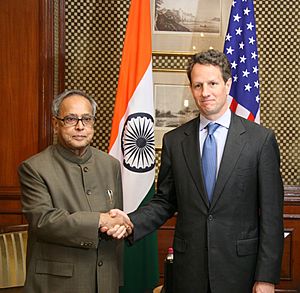
AIG Bonus Controversy
In 2009, there was public anger when it was revealed that AIG, after being bailed out by the government, paid large bonuses to its employees. Many people felt this was unfair.
Geithner said he did not know about the bonuses ahead of time. He called the head of AIG to protest the payments. He urged the company to change the bonus contracts and asked employees to return some of the money.
Working with China
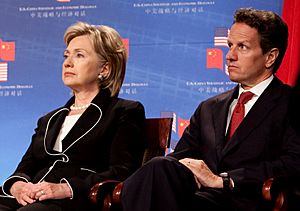
As Treasury Secretary, Geithner also dealt with important international issues. He worked closely with China, a major economic partner of the United States.
He stated that China was keeping the value of its currency, the renminbi, artificially low. This made Chinese products cheaper and American products more expensive, which hurt American businesses. Geithner pushed China to change its currency practices. He also co-chaired important meetings between the U.S. and China to discuss economic issues.
Life After the Treasury
Geithner left his job as Treasury Secretary on January 25, 2013. He then joined the Council on Foreign Relations, a non-profit think tank.
In 2014, he became the president of Warburg Pincus, a private equity firm. Private equity firms invest in different companies to help them grow. In 2023, he became the chairman of the firm.
He has also written a book about his experiences during the financial crisis called Stress Test: Reflections on Financial Crises. He lectures at the Yale School of Management and is involved with charities like the International Rescue Committee.
Personal Life
Geithner married Carole Sonnenfeld in 1985. They met when they were both students at Dartmouth College. She is a clinical social worker and a professor at George Washington University School of Medicine. They have two children.
In Media
Geithner's role in the financial crisis has been shown in movies. He was played by actor Billy Crudup in the HBO film Too Big to Fail. He was also played by Alex Jennings in the BBC movie The Last Days of Lehman Brothers.
Images for kids
-
Geithner and Obama aboard Air Force One, 2009
See also
 In Spanish: Timothy Geithner para niños
In Spanish: Timothy Geithner para niños


